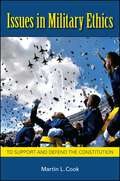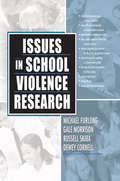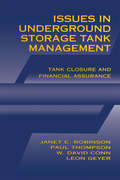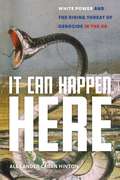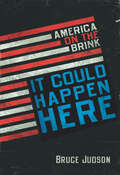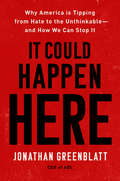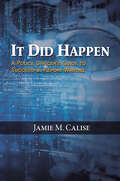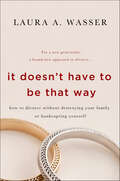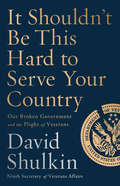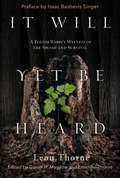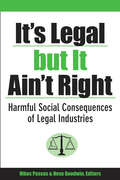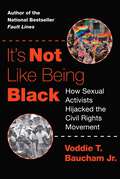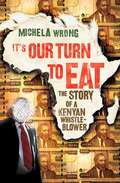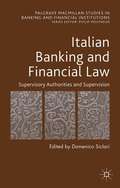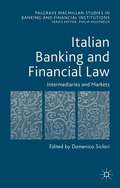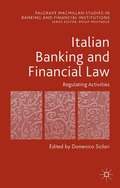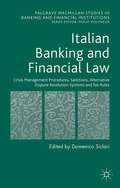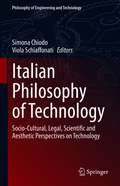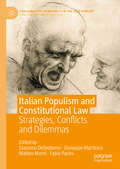- Table View
- List View
Issues in Military Ethics: To Support and Defend the Constitution
by Martin L. CookReflecting on a seventeen-year career teaching at military educational institutions of the Air Force, the Army, and the Navy, Martin L. Cook finds a powerful but underappreciated basis for military ethics in the oath to the Constitution that members of the armed services pledge. In Issues in Military Ethics, Cook considers the role of airpower in counterinsurgency war and the place of robotic weapons systems on the battlefield, but he also looks beyond ethics in the conduct of war to issues arising in military life generally. He addresses a range of other issues with pressing contemporary relevance, including civil-military relations, ethics education, and religion, in particular the ascendency of evangelical Christianity in military culture. This volume serves as an important resource for scholars, members of the armed services, and educators alike.
Issues in School Violence Research
by Rusell Skiba Gale Morrison Michael Furlong Dewey Gene CornellExplore the most effective methods of studying school violence!School violence and safety research will move forward and make unique scientific contributions only if it develops a core literature that critically examines its measurements, methods, and data analysis techniques. Issues in School Violence Research is the first book to expose the limitations of previous research, to critically examine methodological and measurement practices, and to provide guidelines to enhance future school violence research. Early literature focused on school violence as a social problem, not as an integrated area of legitimate scientific research. It is time to move beyond the social problem era of school violence to begin critically assessing its common research practices.Until recently, there has been such a rush to gather information about school violence that the methods used have hardly been questioned. The editors of this book are some of the first to raise questions about how the field conducts its research, especially with regard to self-reports among students. Issues in School Violence Research addresses significant measurement and methodological issues in school violence research. The contributors have been conducting school research for more than 15 years. To enhance your understanding of the practices used-past and proposed-numerous tables are included.In Issues in School Violence Research, you&’ll find information about: school-level warning signs of safety problems weapon possession using office referral records in school violence research identification of bullies and victims data quality issues in student risk behavior surveys extreme response bias patterns for youth risk behavior surveys the structure of student perceptions of school safety and much more!Issues in School Violence Research is an important resource for anyone, from professors to policymakers. It is also appropriate as a textbook for research methodology courses. It is only through objective analysis that school violence research can develop new insights. This book presents topics that should stimulate new and better inquiry into the climate within which school violence occurs.
Issues in Underground Storage Tank Management UST Closure and Financial Assurance
by Janet E. Robinson Paul S. Thompson W. David Conn L. Leon GeyerIssues in Underground Storage Tank Management presents a comprehensive description of the many complex facets of hazardous waste management, tank closure, and site assessment. It is also the only book to cover financial assurance of UST remediation. Part I discusses UST closure including regulation, closure techniques, site assessment methods and d
It Can Happen Here: White Power and the Rising Threat of Genocide in the US
by Alexander Laban HintonA renowned expert on genocide argues that there is a real risk of violent atrocities happening in the United States If many people were shocked by Donald Trump’s 2016 election, many more were stunned when, months later, white supremacists took to the streets of Charlottesville, Virginia, chanting “Blood and Soil” and “Jews will not replace us!” Like Trump, the Charlottesville marchers were dismissed as aberrations—crazed extremists who did not represent the real US. It Can Happen Here demonstrates that, rather than being exceptional, such white power extremism and the violent atrocities linked to it are a part of American history. And, alarmingly, they remain a very real threat to the US today. Alexander Hinton explains how murky politics, structural racism, the promotion of American exceptionalism, and a belief that the US has have achieved a color-blind society have diverted attention from the deep roots of white supremacist violence in the US’s brutal past. Drawing on his years of research and teaching on mass violence, Hinton details the warning signs of impending genocide and atrocity crimes, the tools used by ideologues to fan the flames of hate, the origins of the far-right extremist ideas of white genocide and replacement, and the shocking ways in which “us” versus “them” violence is supported by racist institutions and policies. It Can Happen Here is an essential new assessment of the dangers of contemporary white power extremism in the United States. While revealing the threat of genocide and atrocity crimes that loom over the country, Hinton offers actions we can take to prevent it from happening, illuminating a hopeful path forward for a nation in crisis.
It Could Happen Here: America on the Brink
by Bruce JudsonThe severe economic downturn has been blamed on many things: deregulation, derivatives, greedy borrowers, negligent lenders. But could there be a deeper problem that is so severe, so long-lasting, and so dangerous that it makes these problems look like minor swerves in the road? Could we be facing an existential challenge to the promise of America, and to our system of government? Inequality in America has reached historical highs. Throughout human history, this level of disparity has proven intolerable, almost always leading to political upheaval. Though many believe that America will never face a second revolution, that our politics are stable, in It Could Happen Here, Yale School of Management senior faculty fellow Bruce Judson makes the case that revolution is a real possibility here, driven by a thirty-year, unprecedented rise of inequality through six presidencies, three Fed chairmen, three recessions, and many years of expansion. The last time inequality rivaled current levels was in 1928, just before the Crash and the Great Depression. Today we are in worse shape, divided into a tiny plutocracy of super-rich, on the one hand, and a fragile, indebted, unprotected "former middle class" on the other. As Judson shows, revolutions can occur suddenly, as happened with the Soviet Union's 1991 dissolution, and America today exhibits the central precursors to a collapse—extreme economic inequality and an increasingly impoverished middle class. He makes the most disturbing case yet for why our economics are leading us inevitably toward a devastating crisis.When Franklin Roosevelt faced a similar situa-tion, he was saved by World War II. This time, the conflict may be at home, not abroad.
It Could Happen Here: Why America Is Tipping from Hate to the Unthinkable—And How We Can Stop It
by Jonathan Greenblatt"Refreshingly candid . . . Get off Instagram and read this book."—Sacha Baron Cohen From the dynamic head of ADL, an impassioned argument about the terrifying path that America finds itself on today—and how we can save ourselves It&’s almost impossible to imagine that unbridled hate and systematic violence could come for us or our families. But it has happened in our lifetimes in Europe, the Middle East, Africa, and Asia. And it could happen here. Today, as CEO of the storied ADL (the Anti-Defamation League), Jonathan Greenblatt has made it his personal mission to demonstrate how antisemitism, racism, and other insidious forms of intolerance can destroy a society, taking root as quiet prejudices but mutating over time into horrific acts of brutality. In this urgent book, Greenblatt sounds an alarm, warning that this age-old trend is gathering momentum in the United States—and that violence on an even larger, more catastrophic scale could be just around the corner. But it doesn&’t have to be this way. Drawing on ADL&’s decades of experience in fighting hate through investigative research, education programs, and legislative victories as well as his own personal story and his background in business and government, Greenblatt offers a bracing primer on how we—as individuals, as organizations, and as a society—can strike back against hate. Just because it could happen here, he shows, does not mean that the unthinkable is inevitable.
It Did Happen: A Police Officer&’s Guide to Successful Report Writing
by Jamie M. Calise&“If it&’s not in the report, it didn&’t happen.&” This law enforcement adage has stood the test of time for a reason.With calls for greater transparency in the criminal justice system and technology revolutionizing how information is shared, police reports have taken on new life in today&’s law enforcement world. For most new officers, learning how to write a report starts with learning what to write. Make no mistake, a quality investigation is the foundation of a successful police report.By exploring the critical interplay between investigating and writing, It Did Happen: A Police Officer&’s Guide to Successful Report Writing examines case development and narrative construction from the ground up. As it does, it analyzes different categories of police reports and reviews the legal standards and procedural rules that officers regularly encounter. Along the way, it contrasts mandatory and discretionary reporting and discusses how computer-aided dispatch systems can serve as valuable investigative resources. Finally, this book recognizes that police reports are the foremost tool for communicating the facts and circumstances that guide an officer&’s decisions.Whether you attend the police academy, take a criminal justice course, or work in the security field, this book offers several strategies to enhance your report writing skills.
It Doesn't Have to Be That Way: How to Divorce Without Destroying Your Family or Bankrupting Yourself
by Laura A. WasserMaria Shriver, Kim Kardashian, Stevie Wonder, Britney Spears . . . Who do they have in common? Top LA divorce lawyer Laura Wasser.If anyone ever had a platform to write a how to divorce book for today’s generation, it’s Laura Wasser. She has been practicing in her field for nearly twenty years, represented many of the country’s top celebrities and has been celebrated for her unique style, her empathy and her expertise. Wasser’s personal and professional life have been profiled by publications like the Los Angeles Times, Vogue and Interview. Most important, her approach and advice are different from almost any others and she articulates them in a simple manner.Laura Wasser addresses an entire generation who want—and need—to handle their breakups differently. It’s no secret that the divorce rate in America is more than half the marriage rate. Yet the means for dissolving a relationship often seem hopelessly mired in an outdated perception of how it’s supposed to be done. Wasser acknowledges that this generation’s realities have evolved greatly since the previous generation’s in almost every way, and that they want to get divorced cheaply and efficiently and maintain control of the process themselves. The daughter and partner of a prominent Los Angeles Family Law attorney, she has a deep history in the field, and she knows the available roads to uncontested resolution like nobody else. At times psychologist, at times strategist, and distinctly of this generation, Laura and her book will offer readers safer passage through what can be a devastating time, emotionally and financially.
It Happened At Two in the Morning: A Novel
by Alan HruskaA New York lawyer gets wrapped up in a deadly conspiracy in this “legal thriller that really thrills” by the author of Pardon the Ravens (Phoef Sutton, New York Times–bestselling author). At two in the morning, after another long night at work, brash young lawyer Tom Weldon learns that he’s being passed over for partner at his top-drawer New York firm. Maybe his response is rash, or maybe it was a long time coming, but he quits on the spot. Now Tom knows his life is about to change. He just has no idea how different—and dangerous—it’s about to get. On his walk home, Tom discovers a professional hit in progress—and attempting to stop the attack only gets him knocked out. Suddenly, he finds himself held captive in a rural shed somewhere in Pennsylvania. And he’s not alone. The daughter of the murder victim, beautiful playwright Elena Riles, has also been taken hostage. Miles from nowhere, getting out alive will only be the start of their troubles. As Tom and Elena head into Kentucky to evade their captors, they also work feverishly to unravel a criminal conspiracy in this fast-moving thriller. “It hits hard and you keep off balance until the last page. I couldn’t put it down.” —Phoef Sutton, New York Times–bestselling author of Heart Attack and Vine
It Is Illegal to Quack Like a Duck and Other Freaky Laws
by Barbara SeulingAn overview of some unusual laws from all over the world. Did you know... In Los Angeles, California, you cannot dance with a member of the opposite sex unless you are married? Yugoslavia once forbade Halley's comet from appearing in the heavens over that country? It is unlawful in England to wrestle with an untrained bull in public? Throughout history, we have felt the need to legislate our lives and surroundings. On matters from birth to marriage to death, someone, sometime, has passed a decree. Illustrated with Gwenn Seuling's expressive pen-and-ink drawings, this sequel to the best-selling You Can't Eat Peanuts in Church & Other Little-Known Laws is sure to entertain and amaze you. But don't laugh too hard--it may be illegal somewhere!
It Must Be Beautiful to Be Finished: A Memoir of My Body
by Kate GiesA raw, beautiful memoir of a girl born missing an ear, a medical system insistent on saving her from herself, and our culture&’s desire to &“fix&” bodies.When Kate Gies was four years old, a plastic surgeon pressed a synthetic ear to the right side of her head and pulled out a mirror. He told her he could make her &“whole&”—could make her &“right&”—and she believed him. From the age of four to thirteen, she underwent fourteen surgeries, including skin and bone grafts, to craft the appearance of an outer ear. Many of the surgeries failed, leaving permanent damage to her body. In short, lyrical vignettes, Kate writes about how her &“disfigured&” body was scrutinized, pathologized, and even weaponized. She describes the physical and psychic trauma of medical intervention and its effects on her sense of self, first as a child needing to be fixed and, later, as a teenager and adult navigating the complex expectations and dangers of being a woman. It Must Be Beautiful to Be Finished is the story of a girl desperately trying to have a body that makes her acceptable and of a woman learning to own a body she has never felt was hers to define. In an age of speaking out about the abuse of marginalized bodies, this memoir takes a hard look at the role of the medical system in body oppression and trauma.
It Shouldn't Be This Hard to Serve Your Country: Our Broken Government and the Plight of Veterans
by David ShulkinThe former VA secretary describes his fight to save veteran health care from partisan politics and how his efforts were ultimately derailed by a small group of unelected officials appointed by the Trump White House.Known in health care circles for his ability to turn around ailing hospitals, Dr. David Shulkin was originally brought into government by President Obama to save the beleaguered Department of Veterans Affairs. When President Trump appointed him as secretary of the VA, Shulkin was as shocked as anyone.Yet this surprise was trivial compared to what Shulkin encountered as secretary: a team of political appointees devoted to stopping anyone -- including the secretary himself -- who stood in the way of privatizing the agency and implementing their political agenda. In this uninhibited memoir, Shulkin opens up about why the government has long struggled to provide good medical care to military veterans and the plan he had to solve these problems. This is a book about the commitment we make to the men and women who risk their lives fighting for our country, how the VA was finally beginning to live up to it, and why the new administration may now be taking us in the wrong direction.
It Will Yet Be Heard: A Polish Rabbi's Witness of the Shoah and Survival
by Leon ThorneNobel laureate Isaac Bashevis Singer once described Dr. Leon Thorne’s memoir as a work of “bitter truth” that he compared favorably to the works of Tolstoy, Dostoevsky, and Proust. Out of print for over forty years, this lost classic of Holocaust literature now reappears in a revised, annotated edition, including both Thorne’s original 1961 memoir Out of the Ashes: The Story of a Survivor and his previously unpublished accounts of his arduous postwar experiences in Germany and Poland. Rabbi Thorne composed his memoir under extraordinary conditions, confined to a small underground bunker below a Polish peasant’s pigsty. But, It Will Yet Be Heard is remarkable not only for the story of its composition, but also for its moral clarity and complexity. A deeply religious man, Rabbi Thorne bore witness to forced labor camps, human degradation, and the murders of entire communities. And once he emerged from hiding, he grappled not only with survivor’s guilt, but also with the lingering antisemitism and anti-Jewish violence in Poland even after the war ended. Harrowing, moving, and deeply insightful, Rabbi Thorne’s firsthand account offers a rediscovered perspective on the twentieth century’s greatest tragedy.
It's All in the Game: A Nonfoundationalist Account of Law and Adjudication
by Allan C. HutchinsonThree questions concerning modern legal thought provide the framework for It's All in the Game: What should judges do? What do judges do? What can judges do? Contrasting his own answers to traditional responses and moving playfully between debates of high theory, daily practices of appellate judges, and his own enlightening analyses of significant court rulings, Allan C. Hutchinson examines what it means to treat adjudication as an engaged game of rhetorical justification. His resulting argument enables the reader to grasp more fully the practical operation, political determinants, and the transformative possibilities of law and adjudication. Taking on leading contemporary theories to explore the claim that "law is politics," Hutchinson delineates a route toward professional, relevant, and responsible--if radical--judicial practices. After discussing the difference between foundationalist, antifoundationalist, and nonfoundationalist legal critiques, he offers a focused, unequivocal, and positive account of the advantages of operating within a nonfoundationalist framework. Although such an approach centralizes the role of rhetoric in law, Hutchinson claims that this does not necessitate a turn away from politics or, more particularly, from a progressive politics. Driving home the political and jurisprudential impact of his critique and of his account of nonfoundationalist alternatives, he urges judges and jurists to engage in law's language game of politics. This engaging book will interest linguistic philosophers, legal theorists, law students, attorneys, judges, and jurists of all stripes.
It's Legal but It Ain't Right: Harmful Social Consequences of Legal Industries
by Nikos Passas Neva GoodwinMany U.S. corporations and the goods they produce negatively impact our society without breaking any laws. We are all too familiar with the tobacco industry's effect on public health and health care costs for smokers and nonsmokers, as well as the role of profit in the pharmaceutical industry's research priorities. It's Legal but It Ain't Right tackles these issues, plus the ethical ambiguities of legalized gambling, the firearms trade, the fast food industry, the pesticide industry, private security companies, and more. Aiming to identify industries and goods that undermine our societal values and to hold them accountable for their actions, this collection makes a valuable contribution to the ongoing discussion of ethics in our time. This accessible exploration of corporate legitimacy and crime will be important reading for advocates, journalists, students, and anyone interested in the dichotomy between law and legitimacy.
It's Not About the Coffee: Leadership Principles from a Life at Starbucks
by Howard Behar Janet Goldstein"At Starbucks, the coffee has to be excellent, from the sourcing and growing to the roasting and brewing. The vision has to be inspiring and meaningful. Our finances have to be in order. But without people, we have nothing. With people, we have something even bigger than coffee." During his many years as a senior executive at Starbucks, Howard Behar helped establish the Starbucks culture, which stresses the importance of people over profits. He coached hundreds of leaders at every level and helped the company grow into a world-renowned brand. Now he reveals the ten principles that guided his leadership--and not one of them is about coffee. Behar starts with the idea that if you regard employees and customers as human beings, everything else will take care of itself. If you think of your staff as people (not labor costs) they will achieve results beyond what is thought possible. And if you think of your customers as people you serve (not sources of revenue) you'll make a deep connection with them, and they'll come back over and over. This approach has been integral to Starbucks from the start, and remains so today. Behar shares inside stories of turning points in the company's history as it fought to hang on to this culture while growing exponentially. He discusses the importance of building trust, facing challenges, daring to dream, and other key principles, such as: Know Who You Are: Wear One Hat. When organizations are clear about their values, purpose, and goals, they find the energy and passion to do great things. Think Independently: The Person Who Sweeps the Floor Should Choose the Broom. We need to get rid of rules--real and imagined--and encourage the independent thinking of others and ourselves. Be Accountable: Only the Truth Sounds Like the Truth. No secrets, no lies of omission, no hedging and dodging. Take responsibility and say what needs to be said, with care and respect. Take Action: Think Like a Person of Action and Act Like a Person of Thought. Find the sweet spot of passion, purpose, and persistence. "It's all about the people" isn't an idea, it's an action. Feel, do, think. Find the balance, but act. Behar believes that as work becomes less hierarchical and as the world economy becomes more and more about relationships and connecting, the principles of personal leadership are more important than ever. This book will show you the way.
It's Not Like Being Black: How Sexual Activists Hijacked the Civil Rights Movement
by Voddie T. Baucham Jr.From the author of the national bestseller Fault Lines comes a book that tackles the next big threat to the church from the social justice movement. It comes in the form of sexual identity movements like feminism and LGBTQIA+. Many elements have already infiltrated the church and must be identified and opposed. This book will equip you to do that.Homosexual advocates first co-opted the civil rights movement to promote same-sex &“marriage.&” Now, with the nearly complete acceptance of Critical Social Justice, intersectionality, and myriad other streams of postmodern, neo-Marxist ideology, the transgender movement has taken the LGBTQIA+ agenda to new heights and threatens not only the family, but the church and the state as well. What&’s worse, many Evangelical leaders, eager to appease the culture, have gone along with this strategy. This book shows believers what is happening, exposes the goals and consequences of the LGBTQIA+ agenda, and explains how to engage this ideology both inside and outside the church.
It's Our Turn to Eat: The Story of a Kenyan Whistle-Blower
by Michela WrongThe true story of one man&’s fight against corruption: "like a John Le Carré novel&” that shows &“how and why Kenya descended into political violence&” (Washington Post). In January 2003, Kenya was hailed as a model of democracy after the peaceful election of President Mwai Kibaki. By appointing respected longtime reformer John Githongo as anticorruption czar, the new Kikuyu government signaled its determination to end the shady practices that had tainted the previous regime. Yet only two years later, Githongo himself was on the run, having secretly compiled evidence of official malfeasance throughout the new administration. Unable to remain silent, Githongo, at great personal risk, made the painful choice to go public. The result was a Kenyan Watergate. Michela Wrong&’s account of how a pillar of the establishment turned whistle-blower—instantly becoming one of the most hated and admired men in Kenya—grips like a political thriller while probing the very roots of the nation&’s predicament.&“A fast-paced political thriller. . . . Wrong&’s gripping, thoughtful book stands as both a tribute to Githongo&’s courage and a cautionary tale.&” —New York Times Book Review
It's Splitsville
by James J GrossThinking about divorce? Already in the process of divorce? You need this book. Divorce is complex, and complications are not what you need when you are facing its emotional and financial pressures. In It's Splitsville: Surviving Your Divorce, veteran divorce attorney James J. Gross breaks down the divorce process for nonlawyers in easy-to-understand steps. He explains the legal system in plain and simple language, and he describes the process of obtaining a fair separation agreement and navigating family law and the legal system. Just as important, it explains the emotional hazards of divorce and how to withstand the myriad pressures you will face. It's Splitsville: Surviving Your Divorce Explains divorce laws in easy-to-understand words. Guides you through the steps for obtaining a separation agreement. Provides a friendly user's manual for divorce court. Helps you and your spouse decide what's best for the children. Shows you how to protect your assets to the legal extent possible. Explains when and how to play hardball. Nearly a million people get divorced each year in the United States. Many, if not most, could be handled far better for all parties involved. It's Splitsville: Surviving Your Divorce will guide you safely through the hazards of divorce, show you how to understand and survive the complicated legal process, explain underhanded tactics and how to combat them, and help emerge on the other side as a stronger, wiser, and better person. "
Italian Banking and Financial Law
by Domenico SiclariItalian banks and financial intermediaries are subject to extensive regulation which has evolved throughout the country's history. There has also been much change to the country's financial regulation in recent years in response to the globalization of markets and intermediaries. The Italian administrative and regulatory system is often perceived as a major obstacle to economic productivity, and some causes of this ineffectiveness are deeply rooted and date back to the Italian unification and juridical culture. This book provides an overview of the Italian regulation of banking and financial activities, and tracks the evolution of its 'economic Constitution' and market trends. It explores a range of topics within Italian regulation, including the regulation of banking activities, investment services and collective portfolio management. It examines in detail the relationship between intermediaries and customers, public offerings of financial instruments and products, public takeover bids, listed companies, insurance and reinsurance business. Among other current topics the authors discuss the link between investor protection and confidence in the financial markets; and assess the financial markets as a source of financing for companies.
Italian Banking and Financial Law
by Domenico SiclariItalian banks and financial intermediaries are subject to extensive regulation which has evolved throughout the country's history. There has also been much change to the country's financial regulation in recent years in response to the globalization of markets and intermediaries. The Italian administrative and regulatory system is often perceived as a major obstacle to economic productivity, and some causes of this ineffectiveness are deeply rooted and date back to the Italian unification and juridical culture. This book provides an overview of the Italian regulation of banking and financial activities, and tracks the evolution of its 'economic Constitution' and market trends. It explores a range of topics within Italian regulation, including the regulation of banking activities, investment services and collective portfolio management. It examines in detail the relationship between intermediaries and customers, public offerings of financial instruments and products, public takeover bids, listed companies, insurance and reinsurance business. Among other current topics the authors discuss the link between investor protection and confidence in the financial markets; and assess the financial markets as a source of financing for companies.
Italian Banking and Financial Law
by Domenico SiclariItalian banks and financial intermediaries are subject to extensive regulation which has evolved throughout the country's history. There has also been much change to the country's financial regulation in recent years in response to the globalization of markets and intermediaries. The Italian administrative and regulatory system is often perceived as a major obstacle to economic productivity, and some causes of this ineffectiveness are deeply rooted and date back to the Italian unification and juridical culture. This book provides an overview of the Italian regulation of banking and financial activities, and tracks the evolution of its 'economic Constitution' and market trends. It explores a range of topics within Italian regulation, including the regulation of banking activities, investment services and collective portfolio management. It examines in detail the relationship between intermediaries and customers, public offerings of financial instruments and products, public takeover bids, listed companies, insurance and reinsurance business. Among other current topics the authors discuss the link between investor protection and confidence in the financial markets; and assess the financial markets as a source of financing for companies.
Italian Banking and Financial Law
by Domenico SiclariItalian banks and financial intermediaries are subject to extensive regulation which has evolved throughout the country's history. There has also been much change to the country's financial regulation in recent years in response to the globalization of markets and intermediaries. The Italian administrative and regulatory system is often perceived as a major obstacle to economic productivity, and some causes of this ineffectiveness are deeply rooted and date back to the Italian unification and juridical culture. This book provides an overview of the Italian regulation of banking and financial activities, and tracks the evolution of its 'economic Constitution' and market trends. It explores a range of topics within Italian regulation, including the regulation of banking activities, investment services and collective portfolio management. It examines in detail the relationship between intermediaries and customers, public offerings of financial instruments and products, public takeover bids, listed companies, insurance and reinsurance business. Among other current topics the authors discuss the link between investor protection and confidence in the financial markets; and assess the financial markets as a source of financing for companies.
Italian Philosophy of Technology: Socio-Cultural, Legal, Scientific and Aesthetic Perspectives on Technology (Philosophy of Engineering and Technology #35)
by Viola Schiaffonati Simona ChiodoThis is the first volume about the Italian philosophy of technology written in English and including novel and translated contributions. The volume presents original research on emerging topics in the field, as well as an overview of the most distinguished Italian approaches to the philosophy of technology. While offering both historical and political perspectives and the contributions of the philosophy of law, philosophy of science, and aesthetics, Italian Philosophy of Technology promotes a novel view on the intersection between continental and analytic traditions in the philosophy of technology.
Italian Populism and Constitutional Law: Strategies, Conflicts and Dilemmas (Challenges to Democracy in the 21st Century)
by Giacomo Delledonne Giuseppe Martinico Matteo Monti Fabio PaciniThis edited volume explores the relationship between constitutionalism and populism in the Italian context. Italian populism is of interest to comparative lawyers for many reasons. Firstly, the country has a long-lasting tradition of anti-parliamentarism over the course of its history as a unitary state. After the 2018 general election, it has turned into the first European country in which two self-styled populist parties formed a coalition government. Although it collapsed in August 2019, many issues that it had raised remain. Secondly, as Italy is a founding member of the European Communities, the constitutional implications of populist politics have to be considered not only within the national framework but also in a wider context. This book argues that the relationship between populism and constitutionalism should not be seen in terms of mutual exclusion and perfect opposition. Indeed, populism frequently relies on concepts and categories belonging to the language of constitutionalism (majority, democracy, people), offering a kind of constitutional counter-narrative.
